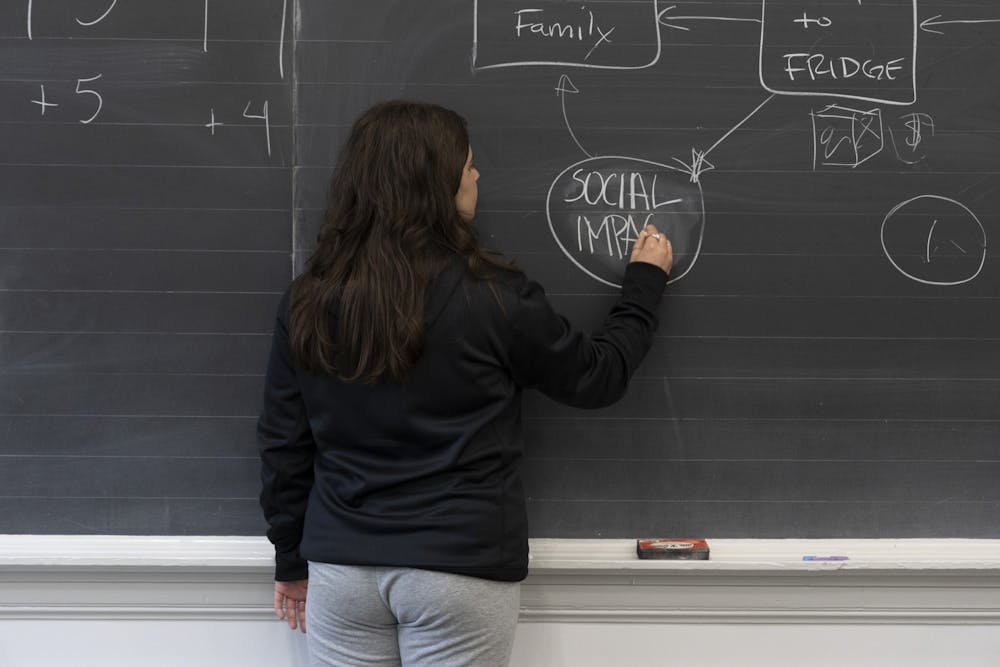During the 2024 summer session, the University began piloting technology-free classes. Coined “Summer Technology Sabbaticals,” the goal of these courses was to encourage students to develop more “thoughtful relationships with their devices.” Students were required to refrain from using any form of technology during class and for a recommended time outside of the classroom. These sabbaticals are not only a unique addition to summer session courses but also have the potential to transform the methods which professors use to cultivate a modern classroom environment. In order to reach the full potential of this practice, technology sabbaticals should be extended beyond the summer session and adopted by professors on a regular basis.
These new technology sabbaticals help to address the increasing role that technology has played in the academic sphere since the pandemic. During the pandemic, the teaching profession was met with a dilemma — how would classrooms manage to carry on as usual without immediate access to traditional learning tools and human interaction? As such, teachers adapted to distance learning by creatively deploying technological resources. Consequently, educators turned to online textbooks, virtual meeting platforms and artificial intelligence. However, while the majority of classes are no longer taught online, much of the academic environment is unable to operate without the use of computers during lectures or taking exams online. Though technology introduced resources to make learning more efficient, they also raise concerns about the future of original thought and authentic student work.
In piloting technology sabbaticals, the University creatively aimed to address the observed risks of technology overuse — a dependency on technology resulting in social isolation and increased depression. Students are challenged to reconceptualize academic life, and implicitly their personal life, without such a heavy dependence on technology. Moreover, by removing technology from the learning experience, students become more socialized and engaged with learning materials. Professors, in reverting to traditional-style classrooms that emphasize intergroup connection and hands-on application, are playing a part in developing the fundamental real-world abilities of social skills and creativity. By requiring students to learn processes using interactive methods, educators are reinforcing critical thinking through developing skills such as problem solving, motivation and engagement.
In addition to these broader benefits of technology sabbaticals, these classes also emphasize experiential learning which will help students translate their theoretical classroom skills to the real world. For example, classes such as Introduction to Book Editing and Production taught students the publishing and production processes through using old-school methods such as editing on hard copy and producing custom editions of texts. Students have plenty of practice utilizing the newest technology both in and out of school. But in order to prepare students for a wide array of post-school environments, the University should adopt the technology-free method more frequently in order to emphasize the importance of technology-free learning.
Additionally, technology sabbaticals have the added benefit of mitigating a recent controversy — the use of artificial intelligence in the classroom. Professors across the country and at the University are deeply concerned with the introduction of AI in classrooms. It is often weaponized by students as a tool to complete assignments and assessments without actually having to do any work. Instituting technology sabbaticals more broadly creates an environment in which students must complete their work without a dependency on AI. With AI advancing quicker than educators are able to combat it, cases of plagiarism and cheating are jeopardizing the learning experience and information retained from courses altogether. Of course, technology sabbaticals will not prevent students from accessing AI tools outside of the classroom. But by encouraging students to refrain from using electronic devices, teachers can stem the tide against AI and hopefully would encourage students to conceptualize other technology-free ways of connecting with their educational material.
While technology-free courses have clear benefits to students’ educational progress, it is unreasonable to assume that they may replace all existing class frameworks. Such blanket implementation neglects the nuances of technology and its use in the classroom. For example, enforcing technology sabbaticals as the norm can put disabled students at a disadvantage, as classrooms that utilize online resources generally improve accessibility. As such, the technology sabbatical method is not and should not be a cookie-cutter solution to a multi-faceted issue. Rather, it should be instituted intentionally across disciplines in a way that balances the benefits of technology sabbaticals with the need for students to understand technological advances in their field.
In academia, educators are often urged to oppose tradition in favor of progress and in the name of efficiency and student development. However, the assumption that we must abandon tradition in order to advance in academia is a weak explanation for the clear attachment our generation has to technology. Poor socialization, battles with mental health and vast increases in cheating and plagiarism due to AI and other technological resources pose the question if the advancements we choose to adopt are inadvertently holding us back. It is time to reevaluate how we view progress — who says tradition cannot propel educators forward?
Farah Eljazzar is an opinion columnist who writes about identity and culture for The Cavalier Daily. She can be reached at opinion@cavalierdaily.com.
The opinions expressed in this column are not necessarily those of The Cavalier Daily. Columns represent the views of the authors alone.







